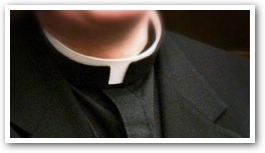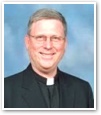The Ten Commandments and Systemic Clericalism
- FATHER JERRY J. POKORSKY
The Ten Commandments represent God's immutable laws.
 Obedience to Jesus and His name brings salvation: "He who believes in Him is not condemned; he who does not believe is condemned already, because he has not believed in the name of the only Son of God." (Jn. 3:18) The Commandments, fulfilled in Jesus, form the "skeletal structure" of Christian morality. Our virtuous response forms the muscles, sinews, and flesh. But we remain in conflict with ourselves because of our sinful inclinations, while the Commandments provoke conflict with the world — and within the Church.
Obedience to Jesus and His name brings salvation: "He who believes in Him is not condemned; he who does not believe is condemned already, because he has not believed in the name of the only Son of God." (Jn. 3:18) The Commandments, fulfilled in Jesus, form the "skeletal structure" of Christian morality. Our virtuous response forms the muscles, sinews, and flesh. But we remain in conflict with ourselves because of our sinful inclinations, while the Commandments provoke conflict with the world — and within the Church.
The secular enemies of the Commandments — the proponents of modern political-correctness — initially insisted: "Do not impose your morality upon me!" Of course, every law — from traffic laws to IRS regulations — does exactly that by regulating societal rules of behavior. The pro-choice ideology aimed to replace the moral structure of the Commandments — and Jesus — with an abnormal framework of moral degradation. The next move was to scold their opposition with smears such as: "Hate is not a family value." So we collectively recoiled, fearing that we were judgmental, politely excused ourselves from the cultural battle, and allowed the evil to fester. With little or no opposition, the secular elites took control of communities, schools, and government — outflanking us in our live-and-let-live lethargy.
We are on the precipice of the final phase: The imposition of unjust laws that not only take away our freedom but insist we also violate the Ten Commandments.
But the enemies of the Commandments are not always secular. They can be found within the Church as well, using the manipulation of language. Indeed it is rare to hear any Church leader invoke God's law as a reason to avoid sinful behavior. To a great extent, Church authorities have enabled the deconstruction by replacing the Commandments with a "non-judgmental" bureaucratic vocabulary to please contemporary sensibilities. Here's a recent and all-too-familiar example:
"Father Kevin O'Brien [President Biden's long-time priest friend] is under investigation over claims that he 'exhibited behaviors in adult settings, consisting primarily of conversations, which may be inconsistent with established Jesuit protocols and boundaries,' the university said on Thursday."
Officials did not reveal whether the alleged violations of established Jesuit protocols and boundaries are mortal sins.
The hierarchy's pathological reluctance to invoke the Commandments undermines the bishops' moral authority. Without the clear invocation of God's law to indict notorious transgressors and without lawful ecclesiastical censures, Catholic politicians like Biden and Pelosi are free to pick-and-choose Church non-binding "policies." This allows them to claim Catholic-in-good-standing status despite radical pro-abortion and pro-gay positions that violate the Fifth and Sixth Commandments. By overlooking intrinsically evil policy positions, even a prominent Church leader like Cardinal Tobin presumes to speak authoritatively: "I think that a person in good conscience could vote for Mr. Biden."
The hierarchy has become complicit by neglect — and sometimes, as we are now all too painfully aware, by participation.
The advocates of so-called LGBTQ ministries in various religious organizations also live by their own rules apart from God's laws. In the name of "inclusive ministry," many priests, bishops, and cardinal archbishops studiously avoid identifying the intrinsic evil of sodomy, mutual masturbation, and placing oneself in the near occasion of sin. The "gay pride" slogan at best celebrates abnormal proclivities. But its real purpose is to desensitize the natural inclination of disgust for sexual perversions and to groom young people for seduction. The hierarchy has become complicit by neglect — and sometimes, as we are now all too painfully aware, by participation.
The mere mention of God's law has become controversial. In response to the Vatican's unexpected Catholic response to a dubium regarding the blessing of same-sex unions ("God "cannot bless sin"), Cardinal Cupich wrote, inexplicably, that the disappointment of gay Catholics was "understandable." Without mentioning Confession, he added that the Church now had to "redouble our efforts to be creative and resilient in finding ways to welcome and encourage all LGBTQ people into our family of faith." Cardinal Cupich may have difficulty with his own Office of Child Protection and the National Review Board if he is too creative with his inclusion. The North American Man-Boy Love Association (NAMBLA) are also "LGBTQ people" who routinely participate in gay pride events. If he invoked the Sacrament of Penance as an instrument of restoration, however, even the prodigal sons of NAMBLA could receive joyful inclusive treatment.
The hierarchy's neglect of the Commandments also distorts the healthy relationship between clergy and the laity. The hierarchy and laity are complementary and irreplaceable. The role of the hierarchy is to guard and teach the first principles of faith and morals; the role of the laity is to apply Christian principles according to their state of life. The hierarchy should serve the truth of the Gospel with humble restraint, avoiding overreach. With the grace of the Sacraments, the laity should respond with virtuous sinews and muscles within the moral structures, applying the truths of Jesus with prudential judgments in the temporal order. The Church's hierarchy represents the authority of Christ; lay associations represent a wide variety of political interests.
But a kind of systemic clericalism that favors inoffensive "Catholic Lite" pastoral strategies has infected the hierarchy. The call for "dialog" frequently replaces the prophetic moral voice of the Church. Consequently, bishops often distance themselves from aggressive Catholic lay endeavors (such as pro-life groups), effectively undermining the rightful role of the laity in the political arena. The general impression is that chanceries, not the laity, orchestrate Catholic political action. Yet in unpopular counter-cultural matters, the bishops (and the USCCB) always play it safe. They are usually the last to react, and only when the battle is already lost and they feel the need to polish their orthodox image. The futile last-gasp sparring with the Biden administration after his election vividly illustrates the exasperating pattern.
A kind of systemic clericalism that favors inoffensive "Catholic Lite" pastoral strategies has infected the hierarchy.
Opposition to the infamous Equality Act is another example of too-little-too-late futility. Cardinal Dolan lamented the Act's attack on religious freedom using persuasive natural law arguments. But everyone knows that Biden will sign the Act into law and he will suffer no serious religious consequences. Beyond appealing to the base of faithful Catholics, Cardinal Dolan's opposition to the Equality Act is a fruitless display of political posturing.
The multiplication of mostly irrelevant ecclesiastical documents not only blurs the distinction between the Church's necessary opposition to intrinsically evil acts and the hierarchy's dubious political agendas, but it also crowds out the work of the lay apostolate. As a result, Catholics and non-Catholics easily conclude that the Church is just another special interest group. Hence, the non-negotiable connection between God's will and conscience is obscured or lost. The history of ecclesiastical political advocacy reveals decades of moral irrelevance and impotence. (Need evidence? How many pro-life activists rely on bishops' voter guides?)
Prospects are grim. The deep state under the Biden banner has begun to steamroll Catholics with the anti-life and gay policies and proposals. We will almost certainly face devastating conscience dilemmas in the months and years ahead. Even priests and bishops will not be immune (despite decades of appeasement). We may lose our tax-exempt status, endure lawsuits, maybe even gain some time behind bars for the crime of practicing the Catholic faith without shame. But it may be time for Church leaders and laity to stand proudly with the Ten Commandments and the saving power of Jesus.
With God's grace, the persecution may be the catalyst that inspires us to show the world the glorious face of Christ. There are precedents. Check out our 2,000-year history.
 This is Meaghen Gonzalez, Editor of CERC. I hope you appreciated this piece. We curate these articles especially for believers like you.
This is Meaghen Gonzalez, Editor of CERC. I hope you appreciated this piece. We curate these articles especially for believers like you.
Please show your appreciation by making a $3 donation. CERC is entirely reader supported.

Acknowledgement
 Father Jerry J. Pokorsky. "The Ten Commandments and Systemic Clericalism." Catholic Culture (March 22, 2021).
Father Jerry J. Pokorsky. "The Ten Commandments and Systemic Clericalism." Catholic Culture (March 22, 2021).
This article is reprinted with permission from Catholic Culture.
The Author
Father Jerry J. Pokorsky is a priest of the Diocese of Arlington. He is pastor of St. Catherine of Siena parish in Great Falls, Virginia.
Copyright © 2021 Catholic Culture



